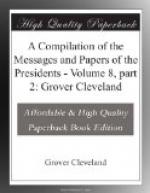But I renew the expression of my conviction that such rapid extinguishment of the national indebtedness as is now taking place is by no means a cause for congratulation; it is a cause rather for serious apprehension.
If it continues, it must speedily be followed by one of the evil results so clearly set forth in the report of the Secretary.
Either the surplus must lie idle in the Treasury or the Government will be forced to buy at market rates its bonds not then redeemable, and which under such circumstances can not fail to command an enormous premium, or the swollen revenues will be devoted to extravagant expenditure, which, as experience has taught, is ever the bane of an overflowing treasury.
It was made apparent in the course of the animated discussions which this question aroused at the last session of Congress that the policy of diminishing the revenue by reducing taxation commanded the general approval of the members of both Houses.
I regret that because of conflicting views as to the best methods by which that policy should be made operative none of its benefits have as yet been reaped.
In fulfillment of what I deem my constitutional duty, but with little hope that I can make valuable contribution to this vexed question, I shall proceed to intimate briefly my own views in relation to it.
Upon the showing of our financial condition at the close of the last fiscal year, I felt justified in recommending to Congress the abolition of all internal revenue taxes except those upon tobacco in its various forms and upon distilled spirits and fermented liquors, and except also the special tax upon the manufacturers of and dealers in such articles.
I venture now to suggest that unless it shall be ascertained that the probable expenditures of the Government for the coming year have been underestimated all internal taxes save those which relate to distilled spirits can be prudently abrogated.
Such a course, if accompanied by a simplification of the machinery of collection, which would then be easy of accomplishment, might reasonably be expected to result in diminishing the cost of such collection by at least $2,500,000 and in the retirement from office of from 1,500 to 2,000 persons.
The system of excise duties has never commended itself to the favor of the American people, and has never been resorted to except for supplying deficiencies in the Treasury when, by reason of special exigencies, the duties on imports have proved inadequate for the needs of the Government. The sentiment of the country doubtless demands that the present excise tax shall be abolished as soon as such a course can be safely pursued.
It seems to me, however, that, for various reasons, so sweeping a measure as the total abolition of internal taxes would for the present be an unwise step.
Two of these reasons are deserving of special mention:




